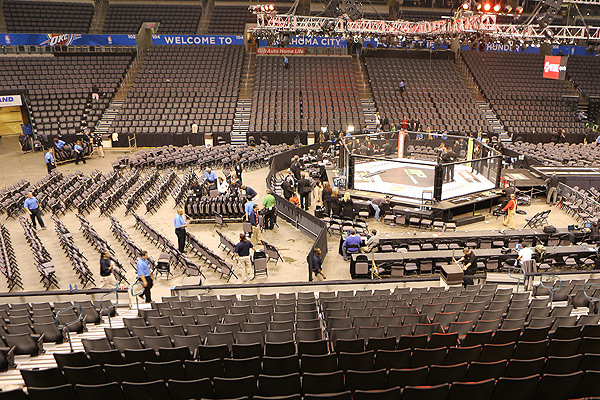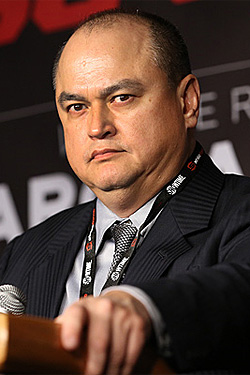Viewpoint: Sentimentality Rules

Strikeforce is no more. What is your favorite SF memory? Tell us
below in the comments section. | Photo: Dave Mandel
A few hours before the Strikeforce grand finale began in Oklahoma City on Saturday, I was asked why the media was so sappy and sentimental when it came to eulogizing the California-based promotion.
After all, Strikeforce had received its fair share of scorn from those very same people over the years. Whether it was the infamous Nashville brawl, cotton candy matchmaking that granted title shots to the likes of Evangelista “Cyborg” Santos or the seemingly never-ending heavyweight grand prix, Strikeforce certainly had its fair share of flaws.
Advertisement
When the news finally broke that Strikeforce would be shutting down for good after its Jan. 12 event, it felt like the entire MMA community breathed a collective sigh of relief. Everyone could finally get on with their lives and the majority of the world’s top mixed martial arts talent could finally merge into one big, happy family.
The event held at the Chesapeake Energy Center was little more than
Strikeforce’s way of playing out the string. Going against a
compelling NFL playoff lineup, the card had gradually morphed from
Strikeforce “Champions” to Strikeforce “The Auditions,” with a
series of lopsided matchups that made transitioning to the UFC a
mere formality for the most recognizable names on the bill.
WEC 53 this was not, so why all the misty-eyed sentimentality for an organization that had been running on fumes for some time? In part, because it is human nature to look back on the past with a kind of warm-hearted nostalgia. Even the bad things, like the Jason “Mayhem” Miller-Diaz brothers melee that cost Strikeforce a CBS deal, can be perceived as part of an upstart promotion’s colorful history. Plus, the presence of Strikeforce as a solid No. 2 promotion suggested a prosperous MMA landscape where more than one organization could survive and thrive.
We watched Strikeforce grow up before our eyes. When Scott Coker’s brainchild began as a regional promotion in northern California, he could not have possibly known what it would become; that it would rise to prominence on the backs of marketable stars like Frank Shamrock and Cung Le; that it would garner network and premium television contracts; that it would house arguably the greatest collection of heavyweight talent in the sport for a brief period of time; that it would serve as a springboard for women to make their own indelible marks in the cage. During a post-fight interview with Sherdog.com, the Strikeforce CEO had difficulty pinpointing a single moment that defined his company’s legacy. Instead, it was a collaboration of events that made the promotion successful.

Photo: D.
Mandel/Sherdog.com
Coker made Strikeforce a major player.
Coker continued to rattle off key moments, from the heavyweight tournament to the Gilbert Melendez-Josh Thomson trilogy, like a proud parent trying unsuccessfully to pick a favorite offspring. In the end, Coker realized it was the journey that mattered, not the disappointing final destination.
“It’s an honor to watch these guys fight,” he said. “I’m proud of what we accomplished. We had a great staff, but without Showtime, we just would’ve stayed as a regional promotion. I’m really thankful to them. They believed in us.”
More than anything, Strikeforce was able to keep its head above water for as long as it did because of one constant: the ability to develop, grow and acquire quality talent. Melendez became one of the world’s top pound-for-pound fighters in the promotion. Nick Diaz, exiled from the UFC, watched his skills mature in the hexagon. Daniel Cormier developed the clout to be able to call out Frank Mir and Jon Jones in his final bout with the company. It was not easy being held up to the lofty standards of its rival -- and eventual big brother -- in Las Vegas, but Strikeforce carried the burden well.
The promotion had one final surprise before its demise, however, and it came in Saturday’s headliner. By most any definition, Tarec Saffiedine was a Strikeforce product, working his way up from the Challengers circuit to bigger and more significant fights as his career progressed. Even though he had earned his spot as an up-and-coming prospect, the Belgian is by no means a household name, and he entered his bout against recently crowned welterweight champion Nate Marquardt as a considerable underdog.
Although Marquardt had made his promotional debut in July with a victory over Tyron Woodley, this had all the makings of a UFC vs. Strikeforce showdown. The Coloradan made his name during a 14-bout stint in the Octagon, consistently hovering around No. 1 contender status in the UFC’s middleweight division. Strikeforce was but a pit stop for the former King of Pancrase before he made amends with UFC President Dana White and returned to ply his trade in the world’s largest MMA organization.
For Saffiedine, the future was far less certain. A win would most certainly clear his path to greener pastures, but, as a not-so-well-known commodity, a loss could potentially result in more dues paying.
For five rounds, Saffiedine struck a resounding blow for his soon-to-be defunct employer, leaving Marquardt’s lead leg looking like it had been worked over by a super-sized meat tenderizer. Fittingly, a Strikeforce guy would go down in history as the final Strikeforce champion. Even with his place in the UFC -- where greater fame and fortune awaits -- virtually assured, Saffiedine could not help but get a little sentimental at the end of the night.
“I guess [the belt] is mine now, but unfortunately, Strikeforce is gone, and I’m really sad about that,” Saffiedine told Showtime Sports. “It’s a great night for me, but it’s a sad night at the same time.”
Most of us can relate.
Related Articles








